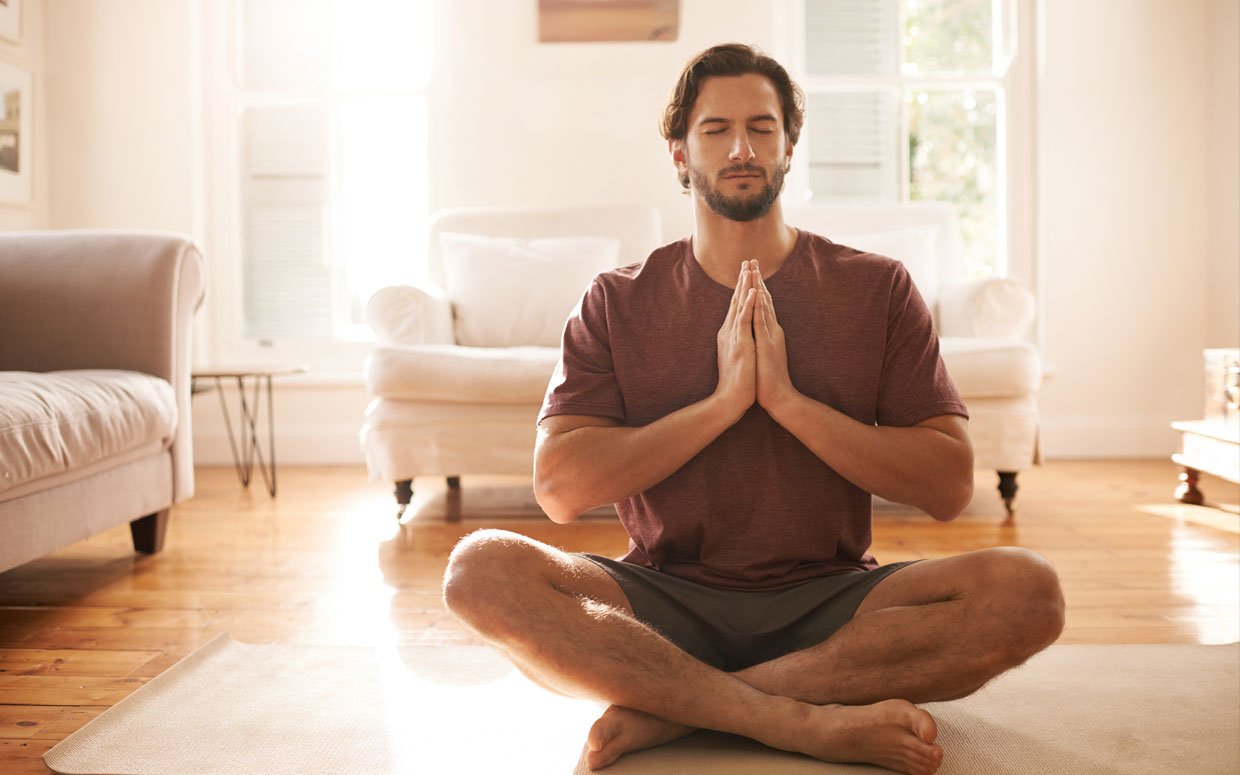In the cold, dark days of winter, many of us may wake up later, leave our houses less, and struggle to stay motivated. These months are likely to feel longer and more stressful than sunnier seasons, which is why prioritising mental health and turning to meditation for its mood-boosting benefits may help.
“Meditation provides an island of sanity in an otherwise chaotic and tumultuous reality,” says Tal Ben-Shahar, PhD, co-founder and chief learning officer of the Happiness Studies Academy.
Meditation has many known health benefits. Mental health and meditation experts share more about the best ways to use this tool to get through the difficult winter months.
Practice Mindfulness Meditation
While there are many techniques worth trying, mindfulness meditation is highly recommended for decreasing worried thoughts, improving mood, and stress management. Best of all, you can use this technique at any time throughout your day.
Dr. Ben-Shahar explains the four leading guidelines of mindfulness meditation and how they can help you in your daily practice.
Allow the mind to rest on a single object. The object can be anything: a physical posture, a bodily sensation, a word, a visual cue, a sound, or even another person. When we rest our mind on an object without trying to change it, without criticising it—just observing it with friendly curiosity—we begin to see clearly.
Return to focus. Mindfulness doesn’t require ongoing concentration. Our mind inevitably wanders and when we catch this happening, we should bring our focus back to whatever our object of meditation happens to be.
Breathe slowly, gently, and deeply. While this applies to most meditation practices, though not all, breath is often the foundation of a practice. Deep, slow, and gentle breaths open us up to positive change.
Practice non-judgement acceptance. The key when you meditate is to rid yourself of expectations. There are no expectations to be calm or joyful or focused. When meditating, give yourself permission to be human. By assuming the light and gentle quality of a calm breath, life can become easier.
“Whether you managed to focus for 20 minutes straight, or caught your mind wandering often and immediately, or were constantly distracted for 15 minutes—it doesn’t matter,” says Dr. Ben-Shahar. “There is no good or bad meditation, there is only meditation.”
Meditate Often for More Benefits
Like writing, running, or cooking, meditation is a skill that should be practiced. The more you practice, the more you improve. But be aware that over-practicing can lead to burnout.
Meditation is meant to ground you where you are, bringing you back to the present and allowing you to recognise all of the senses that surround you. If you’re new to meditation, start slowly and know that short meditation sessions offer just as many benefits as long ones.
Chris Lemig, CHT, contributor to Choosing Therapy, recommends meditating in short, manageable sessions over a long period of time, starting with just five minutes every morning. Gradually, as it becomes a habit, you can add time and even increase the number of sessions you do each day.
“Ten minutes a day, or even three minutes once in a while, can go a long way in resetting our nervous system,” says Dr. Ben-Shahar.
Build a Sustainable Practice
Meditation can be practiced anytime, anywhere, but everyone’s practice looks different. What works for someone else may not work for you, so if you’re new to meditation, listen to your body and be patient with yourself.
If you’re starting a meditation practice or looking to improve your current practice, these suggestions may help.
Listen deliberately. Meditation is present-moment awareness, so we can simply focus on the sounds around us. Rather than perceiving them as distractions, we can perceive them as the object of meditation itself, says Dr. Ben-Shahar.
Sit in silence. Paul Greene, PhD, director of the Manhattan Center for Cognitive-Behavioral Therapy, recommends meditating at a time when you won't be disturbed. It's understandable to want some stress relief when things are chaotic at home, but he believes that's not the right time to meditate. Wait until things are quiet and you know you'll be left alone for a while.
Focus on your breath. The key to meditation, and lowering stress levels, is the breath. Dr. Ben-Shahar recommends taking slow, gentle, and quiet inhalations and exhalations, ideally through the nose and all the way down to the belly.
Avoid over-meditating. Meditation is beneficial, but doing too much of anything can be problematic. By meditating for just 10 minutes per day, Dr. Ben-Shahar says you can change the structure of your brain, ultimately supporting your overall well-being.
Try guided meditation. There are dozens of free meditation videos or recordings online. You can also download an app such as Headspace, Calm, or Sattva. These can be helpful when starting out, says Dr. Greene, but you’ll benefit more from meditating alone.
While meditation can help lower stress levels, Dr. Ben-Shahar says it’s important to realise that stress, in and of itself, is not a problem. Stress can actually help us become stronger, more resilient, and healthier. We just need to incorporate recovery time.
“Think about stressing our muscles in the gym,” Dr. Ben-Shahar says. Doing so makes them stronger. But when there is no recovery, we get injured. Recovery is necessary for gaining benefits, he explains, and meditation provides the recovery we need.
While there’s no one-size-fits-all approach to meditation, you’ll gain the most from a consistent practice. Even if your mind shifts away from your chosen focus or your time gets cut short, you can still enjoy the benefits of meditation.
Be mindful of how you’re feeling this winter. If you’re building a healthy meditation practice but still experiencing heightened levels of stress and anxiety, consider additional methods of self-care such as individual or group therapy. Meditation should be used as a mental health tool, but know it’s not the only one available to you.


